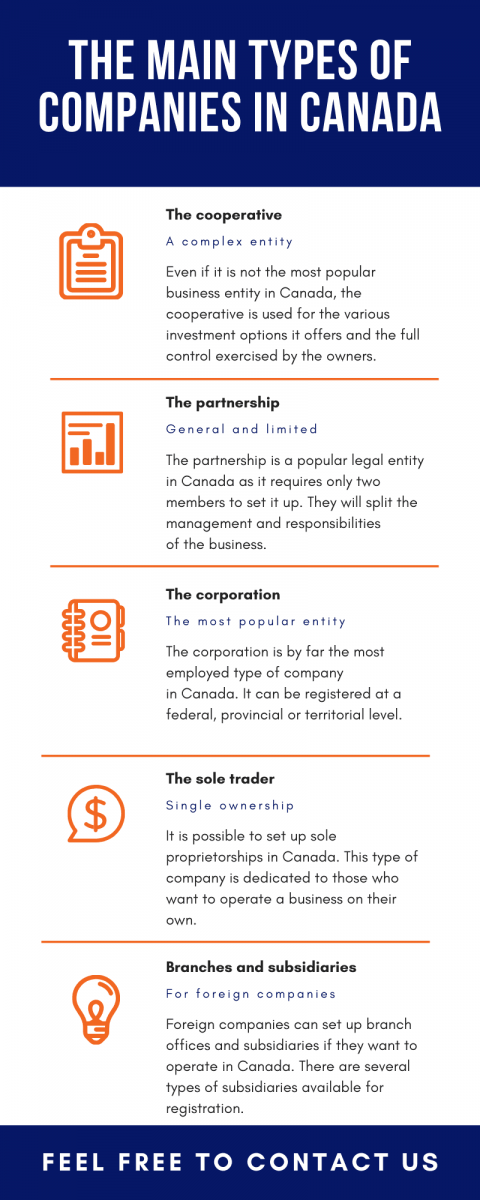Entrepreneurs who want to activate on the Canadian market should, first of all, choose the type of business entity that suits their needs. In Canada, one can set up a sole proprietorship, a partnership (general or limited), a corporation or a cooperative.
In matters of documents and requirements when setting up a company in Canada, we suggest you address to our specialists in company formation in Canada.
The main types of structures in Canada
The Canadian Company Law provides for various types of entities that can be registered by both local and foreign investors, natural persons and companies. These are:
- the cooperative which is a simple business form created by members sharing the same interests;
- the partnership which is a rather popular type of entity in Canada and which requires at least two members;
- the corporation which is the most popular type of company in Canada, often selected by foreign investors;
- the sole proprietorship is the simplest legal entity created by single investors seeking to run small businesses;
- the limited liability company is not often met in Canada, however, it is similar to the partnership;
- the extra-provincial corporation is a popular business form employed by foreign investors coming to Canada
- the public company operates like joint stock companies in other countries and can issue shares for public trading;
- the branch is a business entity employed by foreign companies seeking to expand their operation in Canada;
- the subsidiary is usually registered as a corporation and will serve the purposes of foreign companies expanding here.
There is also the liaison office, however, this is employed for non-commercial activities. In most cases, the representative office is set up by financial companies from abroad seeking to test the Canadian market.
If you are interested in setting up a business in Canada and need guidance in choosing a type of company, our local agents are at your disposal with information on all of them. They can also put you in touch with our foreign partners, if you want to open a company in another country, such as Luxembourg.
Cooperative in Canada
A cooperative in Canada can be registered if certain rules are met. For instance, the owners can entirely manage the business, they have democratic control and limited liability. The revenues are distributed equally because the resources have also been gathered equally. Even though a cooperative is not a preferred type of entity among businessmen, one should know that it puts the accent on common needs, whether in investment matters or other important decisions, like employment or the sale of services and goods.
Partnership in Canada
Partnerships in Canada are limited or general and they are registered with two or more individuals. When setting up a limited partnership, the entrepreneurs will agree on the responsibilities and rights of each partner. The extent of profit share and liability might vary, but all the details are mentioned in the agreement. As for a general partnership in Canada, each individual can manage the business, and he/she is responsible for the debts and obligations of the partnership. If you are interested opening a company in another region, such as Dubai, we can put you in touch with our local partners. You can find more details on companyincorporationdubai.com, a reliable online resource.
Corporation in Canada
From the beginning, it is good to know that a corporation is a separate legal entity from its proprietors. The stockholders are not responsible for the company’s obligations or debts, as the only interest regards the value of their investments. A private corporation in Canada can be registered by one or more individuals, but it is good to know that the majority of the directors should domiciliate in Canada. Such an entity cannot trade shares freely. As for the public corporation, this is subject to listed shares to the public, in accordance with the rules and regulations mentioned in the Ontario Securities Act. No matter the type of company you are interested in, our company formation agents in Canada can guide each entrepreneur when preparing the documents and applying for special permits and licenses. Corporations must also register for VAT in Canada.
Sole proprietorship in Canada
Another type of business structure is the sole proprietorship, and, as the name says, this is owned and controlled by a single person. Such business is subject to lower start-up costs and paperwork compared to the company structures mentioned above. A sole proprietor is in charge of the business management, responsibilities, and debts.
We also invite you to read about the main types of Canadian companies in the scheme below:
The limited liability company in Canada
Most of the time, the limited liability company is met in European countries, which is why foreign investors might be tempted to ask for the incorporation of such a business form. However, in Canada, the limited liability company is regarded as an unincorporated entity with the benefits of the corporation.
The Canadian limited liability company is a hybrid between the sole trader and the partnership, but it offers limited liability to the shareholders.
With a vast experience in company formation matters in Canada, our consultants can offer more information on the limited liability company.
The Canadian extra-provincial corporation
A business form that can only be found in Canada only is the extra-provincial corporation. This type of Canadian company is very popular among foreign investors who can operate in various provinces across the country. The particularity of the extra-provincial corporation resides in the fact that it needs to obtain a license in each province it operates and that it requires a registered agent.
If you are considering starting a business in Canada as an extra-provincial corporation, we can provide you with registered agent services.
The public company in Canada
The public company is usually set up for completing large projects in Canada, however, its most important feature is that it can trade its shares to the general public. This way, this type of company can easily and quickly raise capital.
A Canadian corporation can become a public company once it meets the requirements of the Income Tax Law. This business entity is also suitable for setting up a subsidiary in Canada.
Types of structures for foreign companies in Canada
As mentioned above, foreign companies seeking to operate in Canada can set up branches and subsidiaries. Just like in other countries, these two legal entities can be used as satellite companies, however, there is one substantial difference between them: the degree of independence towards the parent company.
Foreign companies seeking to have complete control over their satellite companies can establish branches in Canada. Those seeking to develop other activities than their own can set up subsidiaries.
If you need information on the best way to choose a business form for expanding a company in Canada, you can rely on our local representatives.
Documents needed to open a company in Canada
Foreign and local investors who want to open companies in Canada must prepare a set of documents, among which:
- the statutory documents of the company in the case of corporation and deeds of establishment in the case of other entities;
- they will also be required to submit their personal information with the Trade Register;
- the declaration through which the directors of the company are appointed;
- other information based on the Canadian province where the company will be registered.
Our lawyers in Canada are at your service for guidance in various matters.
You can find the main types of companies available for registration in Canada from the video below:
How to choose the type of company to register in Canada
Choosing the right business form in Canada is not complicated and foreigners can follow the next steps in order to ease their decision:
- decide based on how large the business will be – the corporation is usually a good choice for small and medium-sized entities;
- choose based on the province where the company will operate (one can also register the company at the federal level);
- choose based on the costs generated by the management of the company and the liability the owner will have in case of bankruptcy, for example;
- one can simply ask for recommendations from our company registration agents in Canada.
Canada is one of the world’s largest economies, as in the 2020 Doing Business Report created by the World Bank, it occupies the 23rd position.
From an economic point of view:
- in 2018, Canada was the 11th largest recipient of Foreign Direct Investments (FDIs) in the world;
- in the same year, it attracted 39,6 billion USD in FDIs, 60% more than in the previous year;
- Canada’s FDI stock in 2018 was 893,959 million USD;
- it offers access to a market made of 30 million consumers;
- Canada has one of the lowest business costs and tax rates on new investments among G7 countries.
For a better understanding of the types of companies available in Canada, we recommend you to get in touch with our team of company incorporation representatives in Canada.



